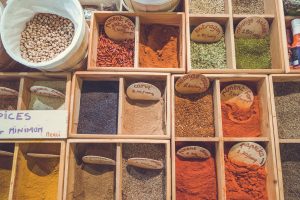 As a lover of history and historical tidbits, I’m always surprised when I discover that something I’d learned as “fact,” simply isn’t true. Sometimes these erroneous facts spread because they are humorous or shocking and easily stick in our memories, but more often than not, they contain just enough truth to make them believable–like today’s topic, whether or not cooks used spices to mask the smell and/or taste of rotting meat.
As a lover of history and historical tidbits, I’m always surprised when I discover that something I’d learned as “fact,” simply isn’t true. Sometimes these erroneous facts spread because they are humorous or shocking and easily stick in our memories, but more often than not, they contain just enough truth to make them believable–like today’s topic, whether or not cooks used spices to mask the smell and/or taste of rotting meat.
This statement usually rears its head in reference to either Medieval or Colonial times. Either way, it just isn’t true.
Imported from the Spice Islands like Indonesia, Sri Lanka, and Malaysia, spices that we consider common today like pepper, cinnamon, and cloves, were once hugely expensive. So expensive, that rare spices were often kept under lock and key. A pound of saffron sold for the same price as a horse. A pound of nutmeg? That would cost the same as seven oxen.
Therefore, adding exotic spices to your meat was a status symbol, and it meant you had money to spare on extravagant items. Likewise, you were not the type of person who ate spoiled meat.
So how did this idea seep into the historical vernacular? Food historian Daniel Myers says the myth can most likely be traced to a man named Jack Cecil Drummond. In his book, The Englishman’s Food, Drummond misinterprets a pivotal word that he uses to justify his theory. Myers points out the word “greene” is used in medieval writings not to describe the color of meat, as Drummond erroneously concluded, but that the meat is unready in reference to the practice of letting meat age before cooking. In addition, Drummond himself actually cites numerous reasons why his tainted meat theory just doesn’t make sense—including documenting laws and punishments for butchers and grocers that served unsafe food.
Join the Conversation: What’s a go to spice in your cupboard?
Sources:
McCormick Science Institute: History of Spices
Drummond’s Rotten Meat: When Good Sources Go Bad, Daniel Myers

